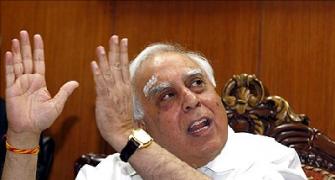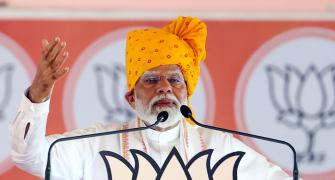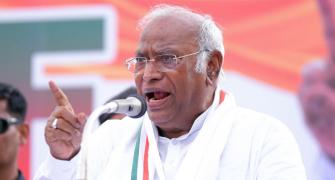 By now it looks as if the spat between the Government of India and US-based social media companies is going to develop into one of our great media spectacles, big enough to push the "2G scam", the "Bellary mining scandal" and other staples of Indian cultural life to the inside pages of our newspapers and off our TV talk shows.
By now it looks as if the spat between the Government of India and US-based social media companies is going to develop into one of our great media spectacles, big enough to push the "2G scam", the "Bellary mining scandal" and other staples of Indian cultural life to the inside pages of our newspapers and off our TV talk shows.The government representatives say they are acting in the interest of National Security, and the US-based social media companies say they are fighting for Freedom of Expression.
The US Embassy in Delhi has pitched in as well, sending out a "media advisory" drawing attention to US Secretary of State Hillary Clinton's speech last week at The Hague.
Without mentioning the ongoing spat in India, she declared that "when ideas are blocked, information deleted, conversations stifled, and people constrained in their choices, the Internet is diminished for all of us".
The last time tempers flared like this was in December 2004 when the CEO of an Internet auction site was arrested for allowing a user to sell a 2:37-minute video clip of a Delhi schoolgirl performing oral sex on her classmate.
It was pointed out that India's Information Technology Act, originally conceived in the context of our rising IT outsourcing industry, was perhaps inadequate for the e-commerce era.
The government appointed a committee to update the IT Act (disclosure: I was named a member), and (second disclosure) I was the person responsible for inserting the section about "intermediaries" into the new IT Act.
This did not require a flash of genius because, by then, American and European e-commerce laws, sympathetic to the plight of the poor Web shopkeeper, had already protected him by naming him an "intermediary", a mere conduit through which buyers and sellers discovered and transacted with each other.
He need take no responsibility for what was being sold in his shop. His responsibility only lay in removing items from his shop if anyone objected.
Unfortunately, it is not just e-commerce and online media entrepreneurs who have benefited from the wonders of the Internet.
Terrorists, purveyors of hate, child pornographers, sellers of snake-oil charms and others have also discovered that anything they did in the brick-and-mortar world could now be done on the Internet at a fraction of the effort and many times the effectiveness.
In addition, the anonymity and cross-border reach of the Internet could do further wonders to
their trade.
Obviously this was bound to throw law enforcement authorities throughout the world into a tizzy and make political leaders feel powerless.
Last August, when mobs were vandalising British cities and co-ordinated their efforts using social media tools, David Cameron, the prime minister and the leader of the Conservative Party - that centuries-old upholder of civil liberties - wondered aloud in the House of Commons "whether it would be right to stop people communicating via these websites and services".
In February this year, the blog "A Gay Girl in Damascus"by Amina Abdallah Araf al-Omari started gathering a large international following during the uprising in Syria.
Amina's description of her participation in street protests was carried in prestigious media outlets like CNN, The Guardian and The New York Times.
Then, in June, Amina's cousin, Rania, posted a message that Amina had been snatched by armed men on a Damascus street.
International campaigns were launched to get her released. The "Free Amina" Facebook page had over 10,000 members; activists tweeted using the hashtag #FreeAmina.
All very well - except that Amina was soon discovered to be a man, Tom MacMaster, a student at the University of Edinburgh.
Episodes like this point to the new challenges of identity and veracity that lie ahead for all of us true believers in the tremendous potential of the Internet.
Other disconcerting facts are starting to emerge. Social media appears to be all-pervasive and allows almost anyone to express their views.
Yet, on social-media sites like Twitter, less than two per cent (that's correct, two per cent) of the people who throng there actually express any views of their own by making postings; 99 per cent merely "follow".
Even more disconcertingly, a large number of these posts come from public relations firms acting for celebrities or from "bots", computer programmes that do automated posting.
This tiny base of participation in social media makes many of us worry. Ismael Peña-López, a professor at the School of Law and Political Science at Spain's University of Catalonia, says it best when he asks whether the Internet is creating a new class of "e-Aristocrats", a tiny group composed of "supra-national economic elites", who are adept at using social-media tools but whose views and opinions may have no correspondence with the rest of the population.
This contrast is magnified in countries like India where Internet access, particularly broadband, is still the preserve of the well-to-do.







